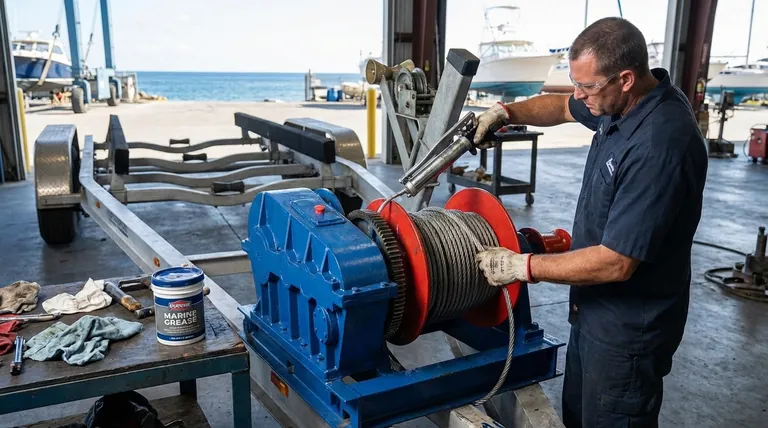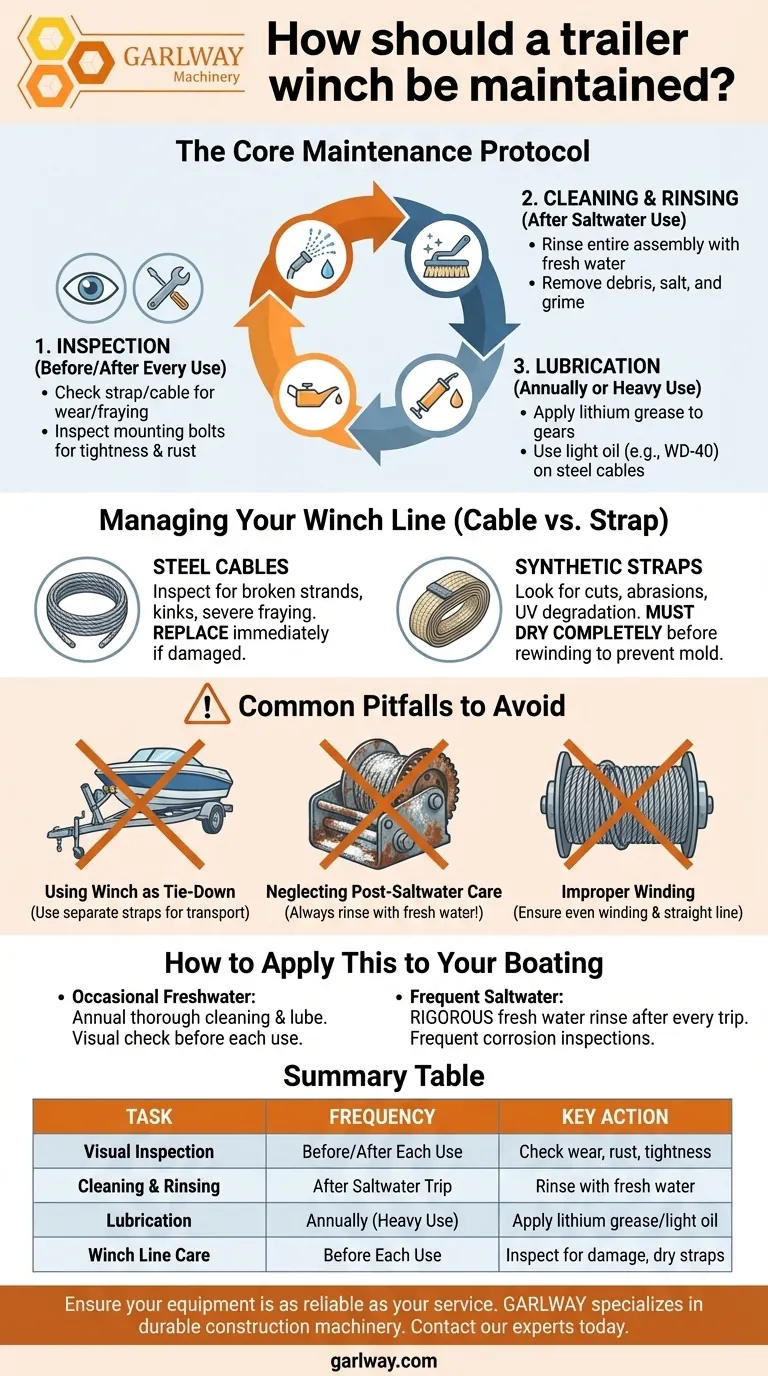To properly maintain a trailer winch, you must perform regular inspections, keep its mechanical parts lubricated, and clean it meticulously, especially after saltwater exposure. The core of effective maintenance involves checking the strap or cable for wear before each use, rinsing the entire assembly with fresh water after saltwater trips, and ensuring the gears are lubricated annually to prevent rust and ensure smooth operation.
The goal of winch maintenance is not just to prevent rust, but to ensure absolute reliability and safety at the boat ramp. Consistent, proactive care is the only way to prevent equipment failure when you need it most.

The Core Maintenance Protocol
A reliable winch is the result of a simple, consistent maintenance routine. This protocol can be broken down into three key areas: inspection, cleaning, and lubrication.
Step 1: Regular Visual Inspections
Before and after every use, perform a quick visual check. Look for signs of wear and tear that could lead to failure under load.
Pay close attention to the mounting bolts securing the winch to the trailer. They should be tight and free of excessive rust.
Step 2: Cleaning and Rinsing
Debris, salt, and grime are the primary enemies of your winch. Keeping it clean is fundamental.
After any use in saltwater, rinsing the entire winch—including the strap or cable—with fresh water is the single most important maintenance task you can perform. This neutralizes corrosive salt and prevents it from seizing moving parts.
Step 3: Strategic Lubrication
Proper lubrication prevents rust and reduces friction on critical components. This should be done annually or more often for heavy use.
For electric winches, use a lithium-based grease on the internal gears. Be careful to avoid getting any grease on the clutch lining. For steel winch cables, a light coating of an oil like WD-40 can be applied as you wind it onto the drum to prevent rust.
Managing Your Winch Line (Cable vs. Strap)
The winch line is the most common point of failure. Whether you have a steel cable or a synthetic strap, it requires specific attention.
For Steel Cables
Inspect the entire length of the cable for broken strands, kinks, or severe fraying. A frayed cable is significantly weakened and must be replaced immediately.
Always replace a damaged cable with a new one of identical diameter and strength specifications.
For Synthetic Straps
Look for cuts, abrasions, or frayed edges. UV exposure from the sun can also degrade the strap over time, making it brittle.
If a strap gets wet, it is crucial to unspool it and allow it to dry completely before rewinding it. A wet strap stored on the drum can develop mold and mildew, which will rot the fibers from the inside out.
Common Pitfalls to Avoid
Many winch failures are caused by simple, avoidable mistakes. Understanding these common errors is key to ensuring longevity and safety.
Mistake 1: Using the Winch as a Tie-Down
A winch is designed for pulling, not for securing a boat during transport. Its gears and brake are not built to handle the dynamic bouncing and shifting forces of a boat on the road.
Always use separate, heavy-duty tie-down straps to secure the bow and stern of your boat to the trailer for transport.
Mistake 2: Neglecting Post-Saltwater Care
Saltwater is incredibly corrosive. Failing to rinse your winch with fresh water after a trip is the fastest way to cause rust, seize gears, and degrade electrical connections. This simple step is non-negotiable for saltwater boaters.
Mistake 3: Improper Winding
When retrieving your boat, ensure the strap or cable winds evenly onto the drum. Piling it up on one side can damage the line and put excessive stress on the winch frame. The winch should always have a straight, unobstructed line to the boat's bow eye.
How to Apply This to Your Boating
Your specific maintenance schedule should adapt to how and where you boat.
- If your primary focus is occasional freshwater boating: A thorough annual inspection, cleaning, and lubrication is likely sufficient. Always check the strap/cable for wear before each use.
- If your primary focus is frequent saltwater boating: Rigorous post-trip rinsing with fresh water is your most critical task. You should inspect components for corrosion and wear far more frequently, potentially every few trips.
By treating your winch with this level of care, you ensure it remains a reliable tool rather than a point of failure.
Summary Table:
| Maintenance Task | Frequency | Key Action |
|---|---|---|
| Visual Inspection | Before/After Each Use | Check for wear on strap/cable and rust on mounting bolts. |
| Cleaning & Rinsing | After Every Saltwater Trip | Rinse entire winch with fresh water to neutralize salt. |
| Lubrication | Annually (or more for heavy use) | Apply lithium grease to gears; use light oil on steel cables. |
| Winch Line Care | Before Each Use | Inspect for damage; dry synthetic straps completely before storage. |
Ensure your equipment is as reliable as your service. A well-maintained winch is critical for safety and efficiency on every job site. GARLWAY specializes in durable construction machinery, including heavy-duty winches, concrete mixers, and batching plants designed for the demanding needs of construction companies and contractors globally.
Let us help you build with confidence. Contact our experts today to find the perfect, reliable winch for your trailer and discover how our solutions can enhance your project's safety and productivity.
Visual Guide

Related Products
- Best 18000 Pound Drum Anchor Trailer Winch
- Warn Winch Windlass Boat Trailer Winch
- 12000 lb Electric Boat Trailer Winch with Windlass Anchor Warn
- HZS75 Concrete Batching Plant Cement Mixer Price Concrete Mixer Bunnings Mixing Plant
- HZS180 Ready Mix Concrete Plant for Foundations with Sand and Cement
People Also Ask
- How are trailer winches rated? A Guide to Safe & Effective Load Capacity
- How does the cable system work in trailer winches? Unlock the Mechanics for Safe & Powerful Pulling
- What is the purpose of a trailer winch? Achieve Safe & Effortless Heavy Loading
- How are trailer winch sizes determined? Match Capacity to Your Boat's Weight for Safe Loading
- How do trailer winches benefit boat owners? Achieve Safe & Effortless Boat Loading



















